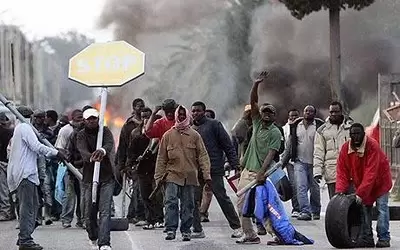War of the Poor in Southern Italy Exposes the Harsh Reality of Farmworker Exploitation

On January 7 a group of migrant – mostly African – farmworkers rioted in the Southern Italian (Calabria) town of Rosarno. They clashed with the police and local inhabitants, some of whom fought back with iron bars.
Their anger was triggered by an attack on two farmworkers by a group of young local men. Following these events, about 1,200 immigrants fled Rosarno and the surrounding area, escorted by Doctors Without Borders and local anti-mafia NGO staff to a refugee camp in Bari, where they requested political asylum. A large number of them will likely be deported.
This outrageous episode, probably the worst in years in Italy, has drawn the attention of the international media to an obscure rural village and the tense relationship between Italians and the undocumented foreigners on whom much of the economy depends.
While Italy relies extensively on foreign labour for domestic work, child and elderly care, the Rosarno 
Over the summer of 2009, the IUF affiliate FLAI-CGIL engaged in a major effort to reach out to undocumented tomato pickers and their local communities, informing them of their rights and encouraging them to join the union. Over the years, FLAI-CGIL has repeatedly called on the government and the employers associations to take action against labour trafficking and other corrupt and exploitative practices.
The African workers in Rosarno are mostly employed in mandarin and orange harvesting, earning about 25€ (35$) a day, of which 5€ go to the gangmaster. Many suspect that the powerful local mafia – the “N’drangheta” which is deeply entrenched in the traffic and exploitation of undocumented farmworkers – orchestrated part of the repressive response to the immigrant upheaval.
The weakness of the regional economy creates competition between immigrant labour and parts of the local workforce. While the orchards still benefit from EU agricultural subsidies (in some cases to the benefit of criminal landowners), Italian citrus faces strong competition from cheaper Spanish oranges and Brazilian orange juice concentrate. Some growers prefer to let the fruit rot on the trees rather than harvest and sell them, stoking social tension by reducing opportunities for work in a region where unemployment averages 20%.
Following the Rosarno riots, FLAI-CGIL denounced the position of the Italian government, which entirely blamed the undocumented workers for the tension which burst into violence. In a press release the union said, “The riots highlight once again and in a dramatic way the unacceptable, exploitative, criminal conditions that reign in Italian agriculture. The Minister of Internal Affairs Roberto Maroni seems not to grasp that many of these workers are blackmailed by organized crime gangmasters and farmers who run the extremely profitable business of trading and employing foreign undocumented labour in semi-slavery conditions.” FLAI-CGIL went on to say, “A more radical, comprehensive solution is needed not just for Rosarno but for the whole country. To this end, the Italian Government, civil society, employers and unions need to take joint action once for all to halt these unacceptable exploitative practices and to set free these workers from organized crime blackmailing”.